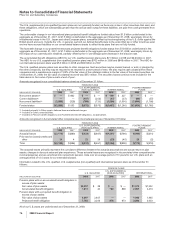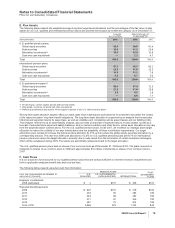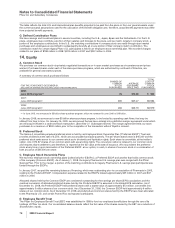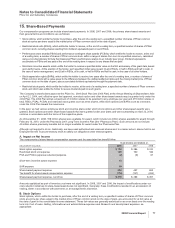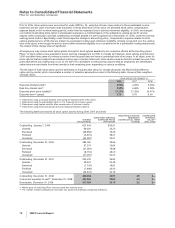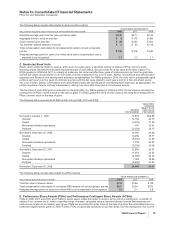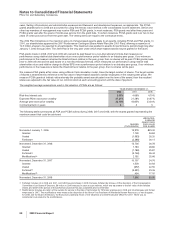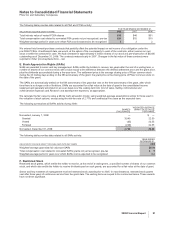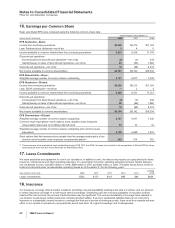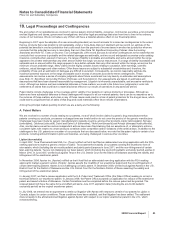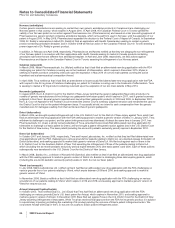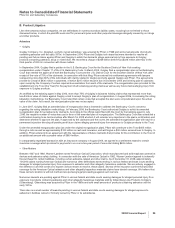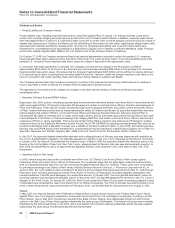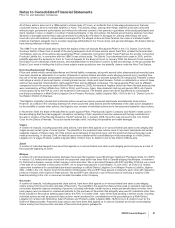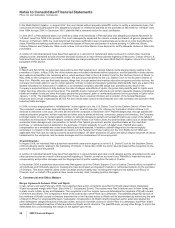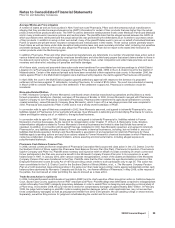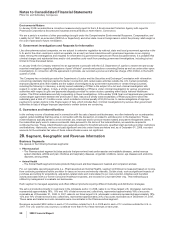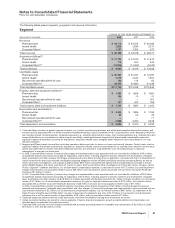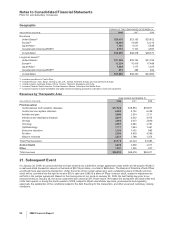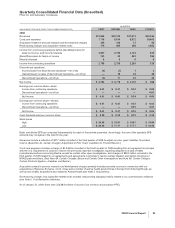Pfizer 2008 Annual Report Download - page 86
Download and view the complete annual report
Please find page 86 of the 2008 Pfizer annual report below. You can navigate through the pages in the report by either clicking on the pages listed below, or by using the keyword search tool below to find specific information within the annual report.
Notes to Consolidated Financial Statements
Pfizer Inc and Subsidiary Companies
Norvasc (amlodipine)
Certain generic manufacturers are seeking to market their own generic amlodipine products in Canada and are challenging our
Norvasc patent in that country, which expires in August 2010. In April 2008, the Canadian Federal Court in Toronto upheld the
validity of our Norvasc patent in our action against Pharmascience Inc. (Pharmascience) and issued an order preventing approval of
Pharmascience’s generic product containing amlodipine besylate, which is the salt form used in Norvasc, until the expiration of our
patent in August 2010. In May 2008, Pharmascience appealed the decision to the Federal Court of Appeal of Canada. In September
2008, Dr. Reddy’s Laboratories Limited (Dr. Reddy’s) filed an application with Health Canada also seeking to market a generic
product containing amlodipine besylate, and in October 2008 we filed an action in the Canadian Federal Court in Toronto seeking to
prevent approval of Dr. Reddy’s generic product.
In addition, in February and April 2008, respectively, Pharmascience and Apotex notified us that they are alleging the non-infringement
of our Norvasc patent in connection with their applications with Health Canada seeking to market in Canada products containing
amlodipine salt forms that are different from amlodipine besylate. In April and June 2008, respectively, we filed actions against
Pharmascience and Apotex in the Canadian Federal Court in Toronto asserting the infringement of our Norvasc patent.
Celebrex (celecoxib)
In March 2008, Mylan Pharmaceuticals, Inc. (Mylan) notified us that it had filed an abbreviated new drug application with the FDA
challenging our patent for Celebrex covering use in the treatment of inflammation, which expires in December 2015. Mylan is
seeking to market a product containing celecoxib upon the expiration in May 2014 of our two main patents covering the active
ingredient and a pharmaceutical composition thereof.
In April 2008, Teva notified us that it had filed an amendment to its previously filed abbreviated new drug application with the FDA
with respect to the 50 mg dose of Celebrex challenging our patent for Celebrex covering use in the treatment of inflammation. Teva
is seeking to market a 50 mg product containing celecoxib upon the expiration of our two main patents in May 2014.
Neurontin (gabapentin)
In August 2005, the U.S. District Court for the District of New Jersey held that the generic gabapentin (Neurontin) products of a
number of generic manufacturers did not infringe our gabapentin low-lactam patent, which expires in 2017, and it granted summary
judgment in their favor. Several generic manufacturers launched their gabapentin products in 2004 and 2005. In September 2007,
the U.S. Court of Appeals for the Federal Circuit reversed the District Court’s summary judgment decision and remanded the case to
the District Court for trial on the patent-infringement issue. If successful at trial, we intend to seek compensation from the generic
manufacturers for damages resulting from their at-risk launches of generic gabapentin.
Detrol (tolterodine)
In March 2004, we brought a patent infringement suit in the U.S. District Court for the District of New Jersey against Teva, which had
filed an abbreviated new drug application with the FDA seeking approval to market a generic version of Detrol. In January 2007, Teva
withdrew its challenge to our patent, and the patent infringement suit was dismissed. At about the same time in January 2007, Ivax
Pharmaceuticals, Inc. (Ivax), a wholly owned subsidiary of Teva, amended its previously filed abbreviated new drug application for
tolterodine to challenge our basic patent for Detrol, and we brought a patent infringement action against Ivax in the U.S. District Court
for the District of New Jersey. The basic patent (including the six-month pediatric exclusivity period) expires in September 2012.
Detrol LA (tolterodine)
In October 2007 and January 2008, respectively, Teva and Impax Laboratories, Inc. notified us that they had filed abbreviated new
drug applications with the FDA challenging on various grounds four patents relating to Detrol LA, an extended-release formulation of
Detrol (tolterodine), and seeking approval to market their generic versions of Detrol LA. We filed suit against each of them in the
U.S. District Court for the Southern District of New York asserting the infringement of three of the patents relating to Detrol LA.,
which (including the six-month pediatric exclusivity period) expire between 2012 (the basic patent ) and 2020. Each of these actions
subsequently was transferred to the U.S. District Court for the District of New Jersey.
In March 2008, Sandoz Inc., a division of Novartis AG (Sandoz), also notified us that it had filed an abbreviated new drug application
with the FDA seeking approval to market a generic version of Detrol LA. Sandoz is challenging three later-expiring patents, which
(including the six-month pediatric exclusivity period) expire in 2020, but not our basic patent.
Vfend (voriconazole)
In July 2008, Matrix Laboratories Ltd. notified us that it had filed an abbreviated new drug application with the FDA challenging on
various grounds four of our patents relating to Vfend, which expire between 2009 and 2016, and seeking approval to market a
generic version of Vfend.
In November 2008, Sandoz notified us that it had filed an abbreviated new drug application with the FDA challenging on various
grounds two of our patents relating to Vfend, which expire in 2016 and 2018, and seeking approval to market a generic version of
Vfend for intravenous use.
Aricept (donepezil hydrochloride)
In October 2005, Teva notified Eisai Co., Ltd. (Eisai) that Teva had filed an abbreviated new drug application with the FDA
challenging on various grounds Eisai’s U.S. basic patent for Aricept, which expires in November 2010, and seeking approval to
market a generic version of Aricept. In December 2005, Eisai filed suit against Teva in the U.S. District Court for the District of New
Jersey asserting infringement of that patent. While Teva has received final approval from the FDA for its generic product, it is subject
to a preliminary injunction prohibiting the marketing of its product pending the outcome of Eisai’s patent infringement action. We
co-promote Aricept with Eisai in the U.S. but are not a party to Eisai’s patent infringement action.
84 2008 Financial Report


